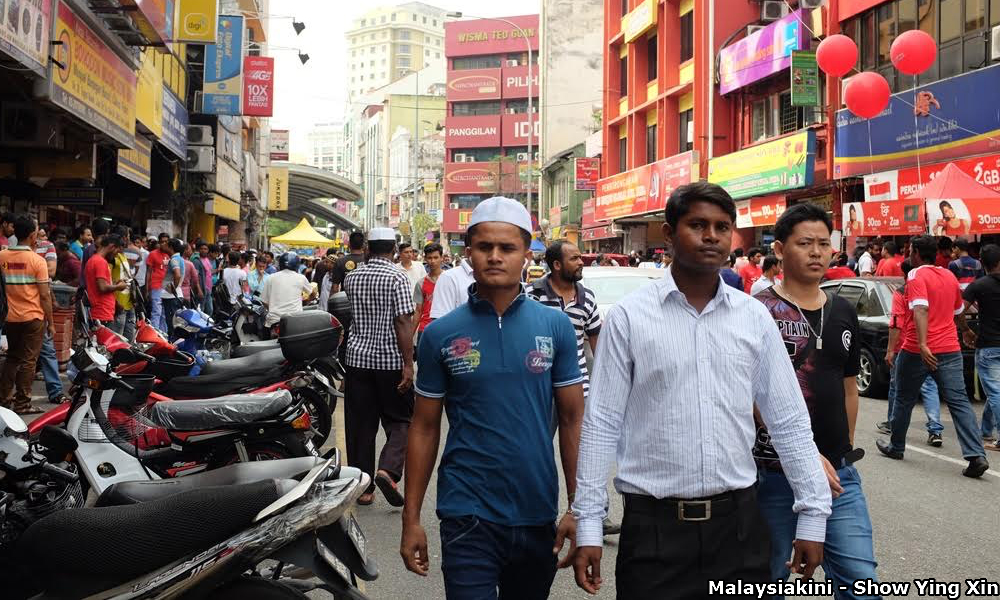Standing anywhere around the Bangla Market, one can see many young men. Sometimes you may come across elderly men or even kids, but you can’t find any women on that street.
Executive director of Tenaganita Glorene A Das said female migrant workers who come to Malaysia are mainly involved in sales, service industry, or the sex industry.
 In a community where the Burmese and Filipinos gather, there are female barbers, domestic workers or saleswomen.
In a community where the Burmese and Filipinos gather, there are female barbers, domestic workers or saleswomen.
However, we can’t seem to find a girl or a woman in Bangla Market.
There is a Bangladeshi guy, Rashid (not his real name), who has set up a stall in Bangla Market. He always sits in front of his stall, calling passersby to buy snacks from Bangladesh.
Asked why we can’t find any female migrant workers in Bangla Market, he said people from Bangladesh come to Malaysia to do tough jobs, which are not suitable for women.
Rashid also complained that the Malaysian government doesn’t allow migrant workers to bring their family along, thus the Bangladeshi men have to come alone.
Then Rashid gave me a strange smile and said: “But if you want to find Bangladeshi amoi (women), then you need to go to that place.”
His finger pointed at a shop opposite the street. It is the second floor of a traditional Chinese shop, completely sealed by old wooden windows. Downstairs, it is a normal Bangladeshi grocery shop. And beside the shop, there is a dark staircase with red lights.
There were two men outside the staircase. One of them is a Chinese who was sitting on a chair indolently and another is a Bangladeshi who beckoned his hand towards the passersby, repeating some Bangladeshi words and appeared to call the passersby to visit his shop.
Asked about the place, the Bangladeshi man said in his broken English: “This is a ***** place, go, you can ****.”
When queried about the women who works there, he raised his head and told me proudly: “There are women from everywhere! Bangladesh, Pakistan, India, Indonesia, Myanmar ... this is a very international place.”
Then he continued: “Today is Raya holiday, there are so many customers today. People keep walking up the stairs, never stop.”
Upstairs looked busy. The women don’t have to celebrate Hari Raya? He sneered, never replied and continued to wave his hands, looking for potential customers.
Old women, abandoned bodies
Attracted by the calls, many went up to the second floor. Inside, they would see mysterious pink lights, just like in movie scenes.
One Bangladeshi came. He stood and looked, probably unable to make up his mind.
There are many small rooms there and outside each room, there were women with heavy make-up, wearing revealing clothes.
The women stood outside their rooms, held their breasts, and asked: “Want (Mau tak)?”, “RM40, can?” The men were just standing there, pondering on their choices.
The house is divided into front, back and the attic. The young and beautiful women will stay in the front rooms, older ones stay in the back rooms and the attic.
Aged women wore sarees and gorgeous accessories, with thick make-up. They would ask “Just RM20, can?” or “Wanna try?”. They would try harder in enticing the men, holding their hands and sometimes drag the customers to their rooms.
When the men choose the young and pretty ones, one can see the look of disappointment on the older women.
The pimps are the most important characters at the brothels. There are always two or three of them, sitting or standing on the street, persuading the migrant workers to walk into the dark staircase behind them.
Pimps in Kota Raya are mostly Chinese or Bangladeshis. They are placed in the middle position within the power structure of the brothels. They answer to the owners of brothels (or human traffickers) and are also in charge of the sex workers.
They are very busy. When the customers walk to the stairs, the pimps will follow them, telling the customers “She is not bad, just RM30, okay?” or “She is good, you will look for her again once you try!” Just like selling livestock.
If anyone challenges them on the cleanliness of the place or whether condoms are used, they would reply: “Of course we use condom, condom good, need to play safe mah!”
One Bangladeshi pimp named Dabha (not his real name) asked me to introduce Chinese women to him, so he can “conquer” women from different nationalities. At the time, a female friend passed by and Dabha looked at her and asked: “Who is this girl?” Quickly, we ran away.
Bound by debts
Nilah (not her real name) who came from India, is 27 years old. She is a divorcee with two young kids.
In order to solve her family's economic crisis, she asked her mother to take care of the kids and she came to Malaysia alone, hoping that she will find a good job through agents.
When she first came to Malaysia, she worked as a cleaner, but soon she found the job not as what her agent described. The agent had promised Nilah that she would work five days a week, but the cleaning company only allowed her to work for two days.
Nilah could not make enough money, not enough even to eat. She just wished she could leave and go back home. But she can't because of the debts she owed the agent, which binds her.
Then the agent suggested to Nilah to try the sex industry. Sex workers don’t have to worry about their livelihood and they can pay their debts in the shortest period of time.
Out of desperation, Nilah consented, and she prayed that she could survive the three months.
Nilah began to receive customers, in the small and smelly room. She had to serve five to 10 men a day. When she has no client, Nilah will stand in front of her room, soliciting for customers.
She will provide the services and the pimp will collect the money from customers.
The pimp will haggle with the customers - RM20 for sexual intercourse, an extra RM10 for taking off her clothes, and another RM40 for “ice-cream service” (blowjob).
But Nilah won't get a cent. Half will go to the owner of the brothel, and the rest to Nilah’s agent. Nilah will get extra money only if her customers pay her tips. She will give that money to the pimps who will buy her food.
Even on her off days, Nilah would not leave the dusky building. At night, she can’t even sleep in the room she works because the brothel runs 24 hours a day.
There will be another girl working in the same room for the night shift. So Nilah and other girls will be squeezed into a crowded and closed room.
About her future, Nilah said helplessly: “I don’t have any idea, I just want to pay the debts and go home.”
Tip of iceberg
Glorene said Nilah’s story is just the tip of the iceberg. The sex industry in Malaysia is growing rapidly and the country is a transit for human trafficking in this region.
 Glorene (photo), who has been in touch with several victims of human trafficking, said: “They came through human trafficking or syndicates. Sometimes after they come here, the life is tough, their husbands will ask them to go and do sex work. Sometimes when the girls think that they cannot perform very well in housework, and they don’t have money, the agents will suggest them to do sex work.
Glorene (photo), who has been in touch with several victims of human trafficking, said: “They came through human trafficking or syndicates. Sometimes after they come here, the life is tough, their husbands will ask them to go and do sex work. Sometimes when the girls think that they cannot perform very well in housework, and they don’t have money, the agents will suggest them to do sex work.
“Out of desperation there are some girls who will do it voluntarily, but some of them are being forced because there is high demand, from our own men and women, and tourists.”
Sex industry to baby factory
If these women get pregnant, what will happen to them? Glorene said previously the pimps would force them to abort. But lately, there have been changes - some customers look for sex with pregnant women.
Hence the pimps will ask the pregnant women to continue working.
“Babies born will be sold for high prices in the black market. Parents who are looking for babies will buy from them. Eventually, the sex industry leads to baby factory," Glorene said.
Some of the kids will be raised by the pimps. When they grow up, they will be trained as sex workers.
Glorene said: “I don’t know why, but there is so much of kinky sex in our society. Even child sex is getting popular.
“Many people thought these things are happening in South America or India. Wrong, they are happening here, in Kuala Lumpur.”
The market for child sex is growing in Malaysia. Children below the age of 12 are the main targets. For the pimps, children are easier to train.
Glorene said a convicted trafficker once told her that “Once a drug is sold, it is sold; once a weapon is sold, it is sold. But human beings, they can be used and used”.
Compared to men who have more autonomy, many female migrant workers are locked up inside darkened rooms.
Cultural mapping
Through the cultural mapping of migrant workers in Kota Raya, we saw a fluid community which is full of energy, but we also saw its dark corners.
 The Chinese came to British-ruled Malaya as migrants.
The Chinese came to British-ruled Malaya as migrants.
And every morning, many Malaysian workers travel to Singapore to seek a better life.
Unfortunately, we always, unconsciously, forget the origin of “migrant workers” and pretend like we are “natives”.
We claim we are owners of the land and begin to exclude the “migrant workers” who came later.
Many people have described Kota Raya as being “invaded” or “colonised”. But when they consider themselves as “victims”, they can be “oppressors” as well.
South Asian and southeast Asian migrants are being discriminated. They are despised as being "lower working class".
But we look up to foreign talents in upper class positions and label them "expats".
Are we all not human beings, wishing and working for a better life?
Related stories
Part One: Mapping Kota Raya's vibrant migrant community
Part Two: Let me sing you a song from my homeland

